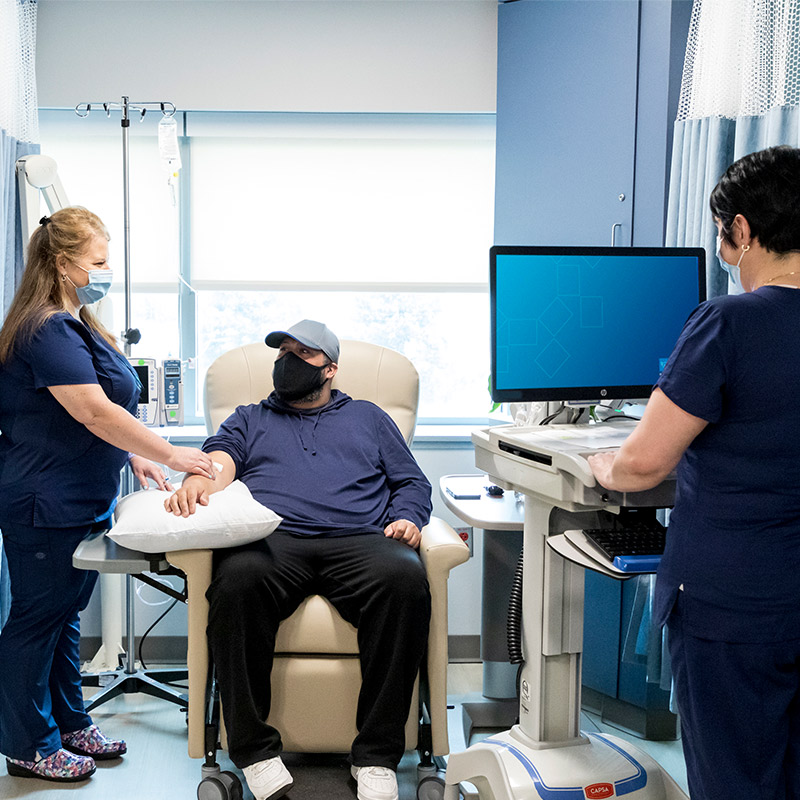Epstein-Barr Virus Linked to MS? What You Need to Know

July 12, 2022
Recent research has shown a link between the Epstein-Barr virus (EBV) and multiple sclerosis (MS).
Whether you have been diagnosed with MS or are curious about what this new research means for the future of MS care, here are answers to a few common questions about EBV and MS.
What is EBV?
EBV belongs to a family of herpes viruses that cause no symptoms in some people, or can cause mononucleosis (mono) in others. Approximately 95 percent of adults eventually become infected with EBV, yet only a few will develop MS.
How is EBV linked to MS?
Researchers from Harvard University had access to serial blood samples from over 10 million active U.S. military personnel between 1993 and 2013. Of the 955 people who developed MS, 801 people had been infected with EBV.
The team also measured blood levels of a biomarker of nerve degeneration called neurofilament light chain (NfL). NfL levels are known to be increased in people with MS. This increase occurred after EBV infection and before MS diagnosis — suggesting that nerve degeneration could be due to EBV infection.
“When compared to healthy controls, the team found that people infected with EBV were 32 times more likely to develop MS than people not infected with EBV,” says Krupa Pandey, M.D., neurologist and director of the MS Comprehensive Care Center at the Neuroscience Institute at Hackensack University Medical Center and associate professor of Neurology at Hackensack Meridian School of Medicine. “Although the results do not suggest that EBV is the only cause of MS, it presents new evidence that EBV could be part of a series of events that, when combined with other factors, results in the development of MS.”
The study, titled “Longitudinal analysis reveals high prevalence of Epstein-Barr virus associated with multiple sclerosis” — published in Science, a research journal, in January 2022 — is important as newer therapies are developed to target immune system cells specifically activated by EBV.
What are researchers doing to learn more about EBV and MS?
The Neuroscience Institute at Hackensack University Medical Center has been selected as a participating site for a Phase 2 clinical trial studying the safety and efficacy of an investigational intravenous cell therapy medication called ATA188, as a potential treatment for progressive forms of MS.
The study is titled, “A Phase 1/2, Two-part, Open-label Dose-escalation and Double-blind, Placebo-controlled Dose-expansion Study with an Open-label Extension to Evaluate the Safety and Efficacy of ATA188 in Subjects with Progressive Multiple Sclerosis.”
ATA188 targets B cells infected with EBV, which remains within B cells in a latent, or “quiet,” state after infection. The medication, which is developed from immune T cells collected from healthy donors, can target immune B cells in the brain and spinal cord that have been infected with EBV.
“Progressive MS offers limited treatment options for patients, which is why we’re so excited to offer this clinical trial,” says Dr. Pandey, who leads the study. “This study has a lot of promise, and with additional research, we’re hoping this will prove an effective treatment option for our patients moving forward.”
Next Steps & Resources:
- Meet our Experts: Krupa Pandey, M.D.
- To make an appointment with Dr. Pandey or a doctor near you, call 800-822-8905 or visit our website.
- Learn about and the Multiple Sclerosis (MS) Comprehensive Care Center at Hackensack Meridian Health.
- If you are a patient diagnosed with progressive MS and are interested in the study, please call the research division at the Neuroscience Institute at 551-996-5565.
The material provided through HealthU is intended to be used as general information only and should not replace the advice of your physician. Always consult your physician for individual care.
Aquatic Therapy Improves Strength after MS Diagnosis

Frank D’Arrigo and his neurologist are taking proactive steps to keep him in the gym as he learns to manage balance and mobility symptoms.

Headaches Explained by a Neurologist
What type of headache might you be experiencing, and what can you do about it? Our neurologist weighs in.

Does Brain Training Work?
Regular exercise and training can boost power in our core. Can training our brains have similar results?



